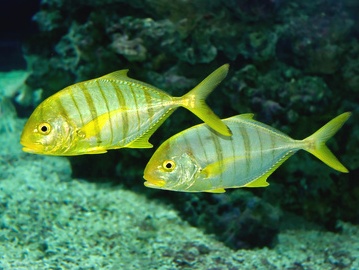The principle of democracy is based on the idea that a group makes better decisions than an individual. However, the decision-making process generally takes longer. This is not the case with mosquitofish - in a shoal they make accurate decisions, fast as lightning, and the rule here is: The bigger the group the more accurate and the faster the decision.
Researchers at the Leibniz Institute of Freshwater Ecology and Inland Fisheries (IGB) in Berlin were able to prove in behavioural experiments with mosquitofish that the accuracy and the speed of collective decision-making increases as the group gets bigger. The scientists found that this improved accuracy in the decision-making process is due to great division of labour during the scanning of the environment. The principle of "many eyes", alongside excellent transfer of information between the individuals means that the decisions are not only more accurate but also taken much quicker. This study was recently published in PNAS.
Fish in big shoals were significantly more successful in escaping a predator than those in small groups or solitary fish. In a group of 16 fish the escape success rate was approximately 90 percent, solitary fish only chose the safe path around 50 percent of the time. The researchers could show that the accuracy of the decisions increased initially with the size of the groups and that the graph then levels.
But which mechanisms does the group use to optimise its decisions? Prof. Dr. Jens Krause, one of the authors of the study says: "We wanted to find out if maybe some of the fish take better decisions than others. In a bigger group there would be more of those "experts" and the group would therefore be more clever. Repeated experiments on solitary fish however did not show individual differences in the decision-making ability. Therefore we investigated if the individual fish possibly divide the labour so that each is only responsible for a particular area of gathering information. Here we were in fact able to see different behaviour when the group size varied: The frequency of the changes of direction of the individual fish was lower in bigger groups."
Self-organisation (flocking behaviour) is characterised by interaction and information transfer between the members of the group. The researchers could prove that the mosquitofish exchange information and they found out that there is hardly any loss of time in the group due to the information transfer. On the contrary: the decisions are taken much faster than those of individuals. "That result really surprised us, because it is often thought that communication costs time", says Krause. How mosquitofish transfer information will be explored by the scientists in the future.
The Leibniz Institute of Freshwater Ecology and Inland Fisheries (IGB) is Germany’s biggest centre for ecosystem related research of inland waters.
What is our motivation? On the one hand the curiosity to understand the basic processes in waters and on the other hand we want to find answers to important questions of the society on sustainable water management.
PNAS February 8, 2011 vol. 108 no. 6 2312-2315, doi: 10.1073/pnas.1007102108
Contact:
| Scienctific contact: Prof. Dr. Jens Krause Departmental head of „Biology and Ecology of Fishes“ Leibniz Institute of Freshwater Ecology and Inland Fisheries (IGB) Phone: +49 (0)30 64181 610, Fax: +49 (0)30 64181 750 E-mail: j.krause@igb-berlin.de Press contact: Nadja Neumann Press and Public Relations Leibniz Institute of Freshwater Ecology and Inland Fisheries (IGB) Phone: +49 (0)30 64181 631, Fax: +49 (0)30 64181 663 E-mail: nadja.neumann@igb-berlin.de Internet: www.igb-berlin.de |


